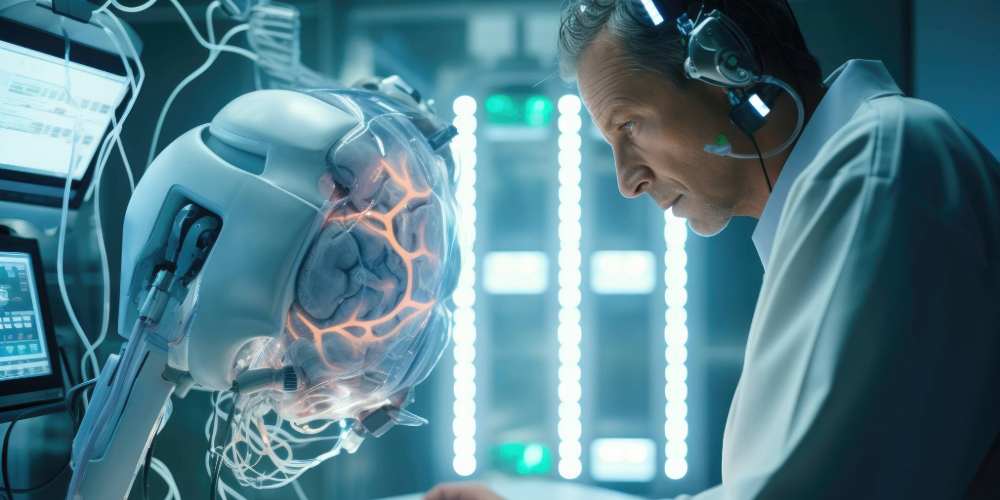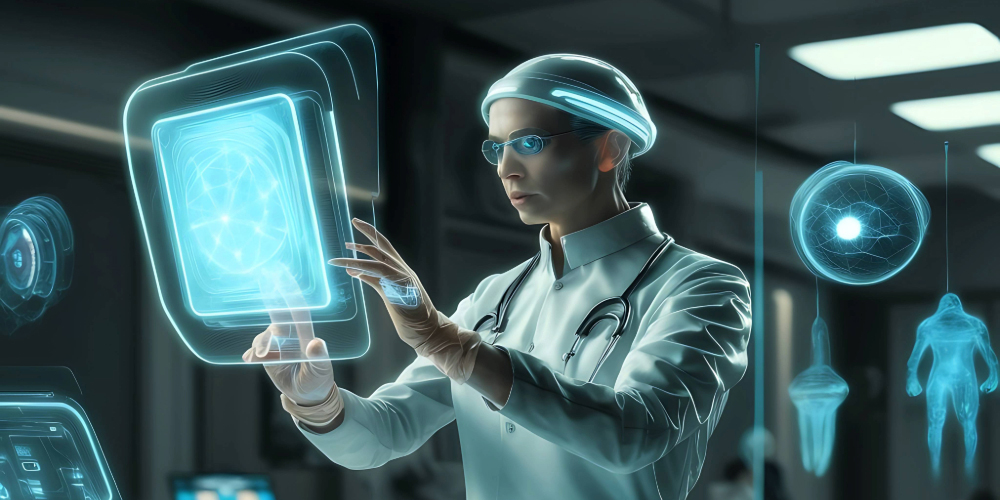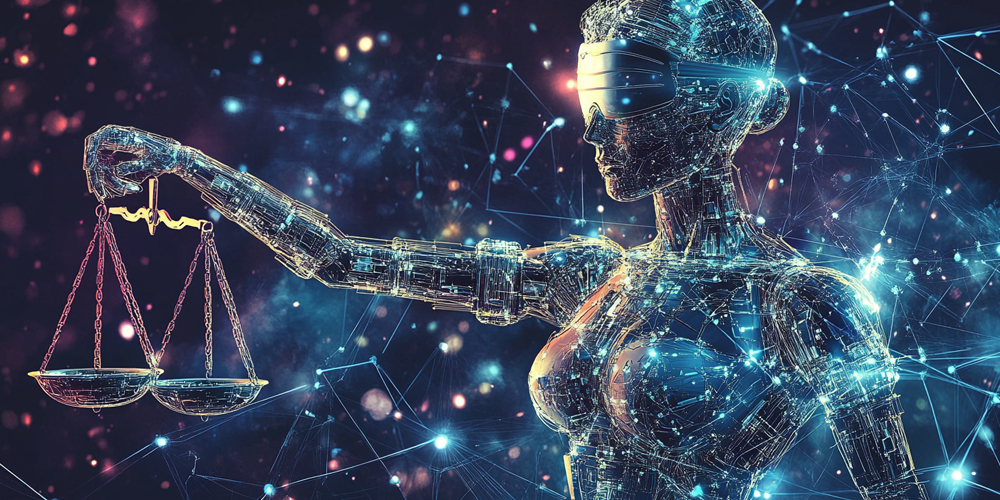AI in Healthcare: Revolutionizing Diagnosis and Treatment
The integration of artificial intelligence (AI) in healthcare is transforming the industry in unprecedented ways. From enhancing diagnostic accuracy to personalizing treatment plans, AI is changing how we approach patient care. As technology continues to advance, the potential for AI in healthcare grows, promising improved outcomes for patients and healthcare providers alike. This article delves into the significant impact of AI on diagnosis and treatment, exploring its various applications, benefits, challenges, and future prospects.
The Evolution of AI in Healthcare
The journey of AI in healthcare began several decades ago. Initially, AI systems focused primarily on data processing and simple decision-making. Today, they can learn from vast amounts of data, identifying patterns and making predictions that are often beyond human capability. This evolution has opened new doors for patient diagnosis and treatment.
Understanding AI Technologies in Healthcare
Various AI technologies are reshaping the healthcare landscape. Machine learning, natural language processing, and computer vision are among the most impactful. These technologies help healthcare professionals make informed decisions quickly and accurately.

Discover the revolutionary impact of AI on diagnosis and treatment.
Machine Learning in Diagnosis
Machine learning algorithms analyze patient data to identify potential health issues. For instance, they can process medical images to detect conditions such as cancer at earlier stages. By improving diagnostic accuracy, these algorithms reduce the likelihood of missed diagnoses. Machine learning also allows for continuous learning. The more data these algorithms analyze, the better they become at recognizing patterns.
Natural Language Processing for Patient Records
Natural language processing (NLP) is another crucial technology in healthcare. It enables AI systems to interpret and analyze unstructured data, such as clinical notes. This capability streamlines patient record management and enhances information retrieval. By automating the extraction of relevant information from patient records, NLP can save time and reduce administrative burdens for healthcare providers.
Computer Vision for Imaging Analysis
Computer vision technology allows AI to analyze visual data, such as X-rays, MRIs, and CT scans. This technology can identify abnormalities in medical images more quickly and accurately than human radiologists. For example, studies show that AI can detect signs of pneumonia in chest X-rays with a higher accuracy than human experts. By leveraging computer vision, healthcare providers can expedite the diagnostic process, leading to faster treatment decisions.
AI Enhancing Diagnostic Accuracy
One of the most significant contributions of AI in healthcare is its ability to enhance diagnostic accuracy. Traditional diagnostic methods often rely on human intuition and experience, which can be subjective. However, AI can analyze extensive datasets to identify correlations and patterns that human practitioners might overlook.
Case Studies in AI Diagnostics
Several case studies illustrate the power of AI in enhancing diagnosis. For example, a study involving radiology demonstrated that AI systems could outperform human radiologists in detecting certain conditions. In this case, AI exhibited higher sensitivity and specificity rates, leading to better patient outcomes.
Another notable example is the use of AI in dermatology. AI algorithms can analyze images of skin lesions to identify malignant conditions like melanoma. Research has shown that AI can match or exceed the diagnostic accuracy of experienced dermatologists. This capability can lead to earlier detection of skin cancer, significantly improving survival rates.
AI in Oncology
In oncology, AI is proving particularly beneficial. Algorithms analyze genetic data to identify mutations associated with cancer. This information helps doctors tailor treatment plans to individual patients, increasing the likelihood of successful outcomes. For instance, AI can predict how a patient will respond to specific chemotherapy drugs based on their genetic makeup. This personalized approach contrasts sharply with traditional methods, which often take a one-size-fits-all approach to treatment.
Personalized Treatment Plans through AI
Personalized medicine is another area where AI is making strides. By analyzing patient data, AI can suggest tailored treatment options based on individual characteristics. This approach contrasts with traditional one-size-fits-all treatments. Moreover, AI has the potential to enhance the development of new therapies by predicting how patients will respond to various treatment options.

Uncover the ways AI is improving patient outcomes and efficiency.
The Role of Big Data
The rise of big data in healthcare complements AI’s capabilities. Healthcare providers collect vast amounts of data daily. AI systems analyze this data to uncover insights that guide treatment decisions. By utilizing data from electronic health records, genomic sequences, and clinical trials, AI can provide recommendations that enhance patient care. This data-driven approach allows for more informed decision-making and ultimately leads to better patient outcomes.
Improving Drug Development
AI is also revolutionizing drug development. Traditional drug discovery is a lengthy and costly process. However, AI algorithms can analyze biological data to predict how compounds will behave in the human body. This accelerates the development of new medications and reduces costs. For instance, AI can identify potential drug candidates faster than traditional methods by simulating interactions at the molecular level.
Real-World Applications of AI in Treatment
AI’s applications in treatment are vast. From surgical assistance to virtual health assistants, AI is enhancing the way healthcare is delivered. These technologies not only improve patient outcomes but also increase efficiency within healthcare systems.
AI-Assisted Surgery
AI-assisted surgical systems provide support to surgeons during operations. These systems analyze real-time data to guide surgical instruments and improve precision. As a result, surgeries can be performed with greater accuracy, leading to quicker recovery times for patients. Moreover, AI can help in planning complex surgeries by simulating various scenarios, allowing surgeons to prepare better.
Virtual Health Assistants
Virtual health assistants powered by AI offer personalized support to patients. They provide reminders for medication, schedule appointments, and answer health-related questions. This technology empowers patients to take charge of their health and enhances overall patient engagement. By providing accessible information, virtual assistants can reduce the burden on healthcare providers while ensuring patients remain informed and involved in their care.
Challenges and Ethical Considerations
While the benefits of AI in healthcare are significant, challenges remain. Issues related to data privacy, algorithm bias, and ethical considerations must be addressed. Healthcare professionals and technologists must collaborate to ensure AI is used responsibly and effectively.
Data Privacy Concerns
Data privacy is a major concern in the healthcare sector. With the integration of AI, sensitive patient data is processed and stored. It is crucial to implement robust security measures to protect this information. Healthcare providers must ensure compliance with regulations, such as HIPAA, to safeguard patient privacy. Additionally, patients must be informed about how their data is used and have the ability to consent to its use.
Addressing Algorithm Bias
Algorithm bias is another critical issue. If AI systems are trained on biased datasets, they may produce skewed results. This can lead to disparities in healthcare delivery. Ensuring diverse and representative training data is essential for fair AI applications. Ongoing audits and evaluations of AI systems can help identify and rectify biases, promoting equity in healthcare.
The Future of AI in Healthcare
The future of AI in healthcare looks promising. As technology continues to evolve, we can expect even more innovations. These advancements will enhance patient care and improve overall health outcomes. Moreover, the integration of AI with other technologies, such as blockchain and IoT, could further revolutionize the healthcare landscape.
Integration with Wearable Technology
Wearable technology is becoming increasingly popular. Devices like smartwatches and fitness trackers collect valuable health data. Integrating AI with these devices can provide real-time insights into a patient’s health status. This can lead to proactive interventions and better management of chronic conditions. For instance, AI can analyze data from wearables to alert patients and doctors about concerning trends, such as elevated heart rates or irregular sleep patterns.

Learn how AI is enhancing accuracy and personalization in healthcare.
Telemedicine and AI
Telemedicine is another area where AI is making a significant impact. Virtual consultations are becoming more common, especially after the COVID-19 pandemic. AI can enhance telemedicine by assisting with patient triage and providing diagnostic support during remote consultations. This capability allows healthcare providers to address patients’ needs more efficiently, ensuring timely interventions.
Conclusion
In conclusion, AI is revolutionizing diagnosis and treatment in healthcare. By enhancing diagnostic accuracy and enabling personalized treatment plans, AI is improving patient outcomes. Despite the challenges, the future of AI in healthcare is bright, with the potential for even greater innovations on the horizon.
As we embrace these advancements, it is essential to prioritize ethical considerations and data privacy. Collaboration among healthcare professionals, technologists, and policymakers will be key to realizing the full potential of AI in healthcare. Together, we can shape a future where AI enhances the quality of care for all patients.





